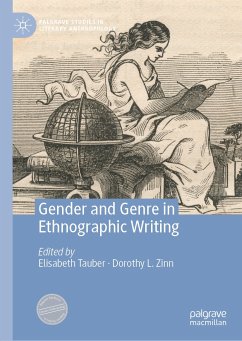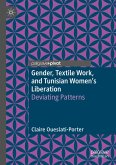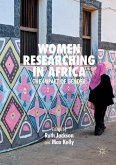"This remarkable volume draws us into a gripping conversation regarding the process by which lived experience is transmuted into ethnographic writing, reminding us forcefully that matters of authorship and its rightful acknowledgement remain to be settled."
- Chandana Mathur, Maynooth University, Ireland
"The contributors to this timely and ambitious book provide thought-provoking insights into how recent anthropology of gender has contributed to a trend toward dialogic and collaborative ethnographic research and writing."
- Signe Howell, University of Oslo, Norway
This book provides new insights into an intense and long-standing debate on women, gender, and masculinity with an explicit focus on ethnographic writing. The six contributors to this book investigate and discuss the multiple connections between ethnographic writing and gender in both the history of anthropology and contemporary anthropology, underlining problems, potentialities, stereotypes, experiments, continuities, changes, and challenges. Building on a prologue by two Malinowski grandchildren and an exploration of the role that Bronislaw Malinowski's first wife, Elsie Masson, played in his literary presentation, the anthropologists collected here problematize writing gender and gendered writing in ethnography, revealing how these twin themes touch the history of the discipline itself and the classics of anthropology. Has the legacy of Writing Culture and Women Writing Culture obviated the need to consider gender in writing? Or could it be that the very mechanics of ethnographic writing are still imbued with hidden gendered divisions of labor? Following the editors' extensive overview of the question, the contributing authors tackle gender and ethnographic writing from various vantages: with a view to the past, but also to the influence of previous feminist critiques in the present, and with accounts of the issues they themselves have faced and the solutions they have devised.
Elisabeth Tauber is Associate Professor of Anthropology at the Free University of Bozen-Bolzano, Italy. She is co-founder of the Malinowski Forum for Ethnography and Anthropology (MFEA).
Dorothy L. Zinn is Professor of Anthropology at the Free University of Bozen-Bolzano, Italy. She is co-founder of the Malinowski Forum for Ethnography and Anthropology (MFEA).
- Chandana Mathur, Maynooth University, Ireland
"The contributors to this timely and ambitious book provide thought-provoking insights into how recent anthropology of gender has contributed to a trend toward dialogic and collaborative ethnographic research and writing."
- Signe Howell, University of Oslo, Norway
This book provides new insights into an intense and long-standing debate on women, gender, and masculinity with an explicit focus on ethnographic writing. The six contributors to this book investigate and discuss the multiple connections between ethnographic writing and gender in both the history of anthropology and contemporary anthropology, underlining problems, potentialities, stereotypes, experiments, continuities, changes, and challenges. Building on a prologue by two Malinowski grandchildren and an exploration of the role that Bronislaw Malinowski's first wife, Elsie Masson, played in his literary presentation, the anthropologists collected here problematize writing gender and gendered writing in ethnography, revealing how these twin themes touch the history of the discipline itself and the classics of anthropology. Has the legacy of Writing Culture and Women Writing Culture obviated the need to consider gender in writing? Or could it be that the very mechanics of ethnographic writing are still imbued with hidden gendered divisions of labor? Following the editors' extensive overview of the question, the contributing authors tackle gender and ethnographic writing from various vantages: with a view to the past, but also to the influence of previous feminist critiques in the present, and with accounts of the issues they themselves have faced and the solutions they have devised.
Elisabeth Tauber is Associate Professor of Anthropology at the Free University of Bozen-Bolzano, Italy. She is co-founder of the Malinowski Forum for Ethnography and Anthropology (MFEA).
Dorothy L. Zinn is Professor of Anthropology at the Free University of Bozen-Bolzano, Italy. She is co-founder of the Malinowski Forum for Ethnography and Anthropology (MFEA).
Dieser Download kann aus rechtlichen Gründen nur mit Rechnungsadresse in A, B, BG, CY, CZ, D, DK, EW, E, FIN, F, GR, HR, H, IRL, I, LT, L, LR, M, NL, PL, P, R, S, SLO, SK ausgeliefert werden.









